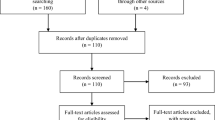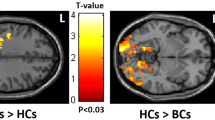Abstract
Purpose
Chemotherapy-related cognitive impairments in breast cancer patients were usually reported through cognitive questionnaires or scales which may be subjective and insensitive. This study is to assess the effect of chemotherapy on cognitive function in breast cancer patients stratified by age using objective electrophysiological measure, the P300 component of event-related potentials (ERPs) with a large sample size.
Methods
Totally, 529 primary breast cancer patients, including 178 cases at initial diagnosis stage and before chemotherapy (Group1), 167 cases during chemotherapy (Group2), and 184 cases post chemotherapy and during follow-up period (Group3), were examined with ERPs (P300 component) to assess the effect of chemotherapy on their cognitive function.
Results
There were significant differences of P300 latency in Group2 (364.74 ± 15.73 ms) and Group3 (364.02 ± 17.12 ms, mean follow-up period of 2.42 years) compared with Group1 (355.13 ± 19.47 ms, P < 0.001), respectively. With further age stratification: in patients of < 50 years, P300 latency was significantly prolonged in Group2 and Group3 compared with Group1 (P < 0.001), respectively; in patients of 50–59 years, P300 latency was significantly prolonged in Group2 compared with Group1 (P < 0.05), but without difference in Group1 and Group3 (P>0.05); In patients of ≥ 60 years, there were no differences of P300 latency among three the groups (P>0.05).
Conclusions
It is first suggested by our objective detection data that the side effect of chemotherapy on cognitive functions in breast cancer patients may decrease with age. Electrophysiological cognitive impairments mainly occur in younger breast cancer patients undergoing chemotherapy and would last for years after chemotherapy, which highlights the importance of early intervention for those patients, especially in younger patients.


Similar content being viewed by others
Abbreviations
- ERPs:
-
Event related potentials
- fMRI:
-
Functional magnetic resonance imaging
- ms:
-
Millisecond
References
Kam JWY, Brenner CA, Handy TC, Boyd LA, Liu-Ambrose T, Lim HJ, Hayden S, Campbell KL (2016) Sustained attention abnormalities in breast cancer survivors with cognitive deficits post chemotherapy: an electrophysiological study. Clin Neurophysiol 127(1):369–378. https://doi.org/10.1016/j.clinph.2015.03.007
Lindner OC, Phillips B, McCabe MG, Mayes A, Wearden A, Varese F, Talmi D (2014) A meta-analysis of cognitive impairment following adult cancer chemotherapy. Neuropsychology 28(5):726–740. https://doi.org/10.1037/neu0000064
Chen H, Guan Y, Yuan G, Zhang Q, Jing N (2014) A perylene derivative regulates HIF-1α and Stat3 signaling pathways. Bioorg Med Chem 22(4):1496–1505. https://doi.org/10.1016/j.bmc.2013.10.018
Ahles TA, Saykin AJ, Furstenberg CT, Cole B, Mott LA, Skalla K, Whedon MB, Bivens S, Mitchell T, Greenberg ER, Silberfarb PM (2002) Neuropsychologic impact of standard-dose systemic chemotherapy in long-term survivors of breast cancer and lymphoma. J Clin Oncol 20(2):485–493. https://doi.org/10.1200/JCO.2002.20.2.485
Ganz PA, Kwan L, Castellon SA, Oppenheim A, Bower JE, Silverman DH, Cole SW, Irwin MR, Ancoli-Israel S, Belin TR (2013) Cognitive complaints after breast cancer treatments: examining the relationship with neuropsychological test performance. J Natl Cancer Inst 105(11):791–801. https://doi.org/10.1093/jnci/djt073
Jansen CE, Cooper BA, Dodd MJ, Miaskowski CA (2011) A prospective longitudinal study of chemotherapy-induced cognitive changes in breast cancer patients. Support Care Cancer 19(10):1647–1656. https://doi.org/10.1007/s00520-010-0997-4
Brezden CB, Phillips KA, Abdolell M, Bunston T, Tannock IF (2000) Cognitive function in breast cancer patients receiving adjuvant chemotherapy. J Clin Oncol 18(14):2695–2701. https://doi.org/10.1200/JCO.2000.18.14.2695
Tchen N, Juffs HG, Downie FP, Yi QL, Hu H, Chemerynsky I, Clemons M, Crump M, Goss PE, Warr D, Tweedale ME, Tannock IF (2003) Cognitive function, fatigue, and menopausal symptoms in women receiving adjuvant chemotherapy for breast cancer. J Clin Oncol 21(22):4175–4183. https://doi.org/10.1200/JCO.2003.01.119
Lepage C, Smith AM, Moreau J, Barlow-Krelina E, Wallis N, Collins B, MacKenzie J, Scherling C (2014) A prospective study of grey matter and cognitive function alterations in chemotherapy-treated breast cancer patients. SpringerPlus 3:444. https://doi.org/10.1186/2193-1801-3-444
Koppelmans V, de Ruiter MB, van der Lijn F, Boogerd W, Seynaeve C, van der Lugt A, Vrooman H, Niessen WJ, Breteler MM, Schagen SB (2012) Global and focal brain volume in long-term breast cancer survivors exposed to adjuvant chemotherapy. Breast Cancer Res Treat 132(3):1099–1106. https://doi.org/10.1007/s10549-011-1888-1
Winocur G, Berman H, Nguyen M, Binns MA, Henkelman M, van Eede M, Piquette-Miller M, Sekeres MJ, Wojtowicz JM, Yu J, Zhang H, Tannock IF (2018) Neurobiological mechanisms of chemotherapy-induced cognitive impairment in a transgenic model of breast cancer. Neuroscience 369:51–65. https://doi.org/10.1016/j.neuroscience.2017.10.048
McDonald BC, Conroy SK, Ahles TA, West JD, Saykin AJ (2012) Alterations in brain activation during working memory processing associated with breast cancer and treatment: a prospective functional magnetic resonance imaging study. J Clin Oncol 30(20):2500–2508. https://doi.org/10.1200/JCO.2011.38.5674
Seigers R, Schagen SB, Van Tellingen O, Dietrich J (2013) Chemotherapy-related cognitive dysfunction: current animal studies and future directions. Brain Imaging Behav 7(4):453–459. https://doi.org/10.1007/s11682-013-9250-3
Peddi PF, Peddi S, Santos ES, Morgensztern D (2014) Central nervous system toxicities of chemotherapeutic agents. Expert Rev Anticancer Ther 14(7):857–863. https://doi.org/10.1586/14737140.2014.911089
Polich J (2004) Clinical application of the P300 event-related brain potential. Phys Med Rehabil Clin 15(1):133–161
Polich J (2007) Updating P300: an integrative theory of P3a and P3b. Clin Neurophysiol 118(10):2128–2148. https://doi.org/10.1016/j.clinph.2007.04.019
Lai CL, Lin RT, Liou LM, Liu CK (2010) The role of event-related potentials in cognitive decline in Alzheimer’s disease. Clin Neurophysiol 121(2):194–199. https://doi.org/10.1016/j.clinph.2009.11.001
Guney F, Genc BO, Kutlu R, Ilhan BC (2009) Auditory P300 event-related potential in tobacco smokers. Clin Neurophysiol 16(10):1311–1315. https://doi.org/10.1016/j.jocn.2008.11.025
Van Der Molen MW, Bashore TR, Halliday R, Callaway E (1991) Handbook of cognitive psychophysiology: central and autonomic nervous system approaches. Chronopsychophysiology: mental chronometry augmented by psychophysiological time markers. Wiley, Chichester
Coles MGH, Rugg MD (1995) Electrophysiology of mind. Event-related brain potentials: an introduction. Oxford University Press, New York
Kreukels BP, Hamburger HL, de Ruiter MB, van Dam FS, Ridderinkhof KR, Boogerd W, Schagen SB (2008) ERP amplitude and latency in breast cancer survivors treated with adjuvant chemotherapy. Clin Neurophysiol 119(3):533–541. https://doi.org/10.1016/j.clinph.2007.11.011
Kreukels BP, Schagen SB, Ridderinkhof KR, Boogerd W, Hamburger HL, Muller MJ, van Dam FS (2006) Effects of high-dose and conventional-dose adjuvant chemotherapy on long-term cognitive sequelae in patients with breast cancer: an electrophysiologic study. Clin Breast Cancer 7(1):67–78. https://doi.org/10.3816/CBC.2006.n.015
Kreukels BP, Schagen SB, Ridderinkhof KR, Boogerd W, Hamburger HL, van Dam FS (2005) Electrophysiological correlates of information processing in breast-cancer patients treated with adjuvant chemotherapy. Breast Cancer Res Treat 94(1):53–61. https://doi.org/10.1007/s10549-005-7093-3
Kreukels BP, van Dam FS, Ridderinkhof KR, Boogerd W, Schagen SB (2008) Persistent neurocognitive problems after adjuvant chemotherapy for breast cancer. Clinical Breast cancEr 8(1):80–87. https://doi.org/10.3816/CBC.2008.n.006
Schagen SB, Hamburger HL, Muller MJ, Boogerd W, van Dam FS (2001) Neurophysiological evaluation of late effects of adjuvant high-dose chemotherapy on cognitive function. J Neurooncol 51(2):159–165
Sharbrough F, Chatrian G-E, Lesser RP, Luders H, Nuwer M, Picton TW (1991) American Electroencephalographic Society guidelines for standard electrode position nomenclature. J Clin Neurophysiol 8(2):200–202
Polich J, Herbst KL (2000) P300 as a clinical assay: rationale, evaluation, and findings. Int J Psychophysiol 38(1):3–19
Heukrodt C, Powazek M, Brown WS, Kennelly D, Imbus C, Robinson H, Schantz S (1988) Electrophysiological signs of neurocognitive deficits in long-term leukemia survivors. J Pediatr Psychol 13(2):223–236
Pfefferbaum A, Roth WT, Ford JM (1995) Event-related potentials in the study of psychiatric disorders. Arch Gen Psychiatry 52(7):559–563
Bennys K, Portet F, Touchon J, Rondouin G (2007) Diagnostic value of event-related evoked potentials N200 and P300 subcomponents in early diagnosis of Alzheimer’s disease and mild cognitive impairment. J Clin Neurophysiol 24(5):405–412. https://doi.org/10.1097/WNP.0b013e31815068d5
Donchin E, Coles MG (1988) Is the P300 component a manifestation of context updating? Behav Brain Sci 11(3):357–374
Kok A (1997) Event-related-potential (ERP) reflections of mental resources: a review and synthesis. Biol Psychol 45(1–3):19–56
Schagen SB, Muller MJ, Boogerd W, Rosenbrand RM, van Rhijn D, Rodenhuis S, van Dam FS (2002) Late effects of adjuvant chemotherapy on cognitive function: a follow-up study in breast cancer patients. Ann Oncol 13(9):1387–1397
Jim HS, Phillips KM, Chait S, Faul LA, Popa MA, Lee YH, Hussin MG, Jacobsen PB, Small BJ (2012) Meta-analysis of cognitive functioning in breast cancer survivors previously treated with standard-dose chemotherapy. J Clin Oncol 30(29):3578–3587. https://doi.org/10.1200/JCO.2011.39.5640
Falleti MG, Sanfilippo A, Maruff P, Weih L, Phillips KA (2005) The nature and severity of cognitive impairment associated with adjuvant chemotherapy in women with breast cancer: a meta-analysis of the current literature. Brain Cogn 59(1):60–70. https://doi.org/10.1016/j.bandc.2005.05.001
Stewart A, Bielajew C, Collins B, Parkinson M, Tomiak E (2006) A meta-analysis of the neuropsychological effects of adjuvant chemotherapy treatment in women treated for breast cancer. Clin Neuropsychol 20(1):76–89. https://doi.org/10.1080/138540491005875
Koppelmans V, Breteler MM, Boogerd W, Seynaeve C, Gundy C, Schagen SB (2012) Neuropsychological performance in survivors of breast cancer more than 20 years after adjuvant chemotherapy. J Clin Oncol 30(10):1080–1086. https://doi.org/10.1200/JCO.2011.37.0189
de Ruiter MB, Reneman L, Boogerd W, Veltman DJ, van Dam FS, Nederveen AJ, Boven E, Schagen SB (2011) Cerebral hyporesponsiveness and cognitive impairment 10 years after chemotherapy for breast cancer. Hum Brain Mapp 32(8):1206–1219. https://doi.org/10.1002/hbm.21102
Yamada TH, Denburg NL, Beglinger LJ, Schultz SK (2010) Neuropsychological outcomes of older breast cancer survivors: cognitive features ten or more years after chemotherapy. J Neuropsychiatry Clin Neurosci 22(1):48–54. https://doi.org/10.1176/jnp.2010.22.1.48
Leong LC, Gogna A, Pant R, Ng FC, Sim LS (2012) Supplementary breast ultrasound screening in Asian women with negative but dense mammograms—a pilot study. Ann Acad Med Singapore 41(10):432–439
Toi M, Ohashi Y, Seow A, Moriya T, Tse G, Sasano H, Park BW, Chow LW, Laudico AV, Yip CH, Ueno E, Ishiguro H, Bando H (2010) The Breast Cancer Working Group presentation was divided into three sections: the epidemiology, pathology and treatment of breast cancer. Jpn J Clin Oncol 40(Suppl 1):i13–18. https://doi.org/10.1093/jjco/hyq122
Youlden DR, Cramb SM, Yip CH, Baade PD (2014) Incidence and mortality of female breast cancer in the Asia-Pacific region. Cancer Biol Med 11(2):101–115. https://doi.org/10.7497/j.issn.2095-3941.2014.02.005
Schagen SB, Muller MJ, Boogerd W, Mellenbergh GJ, van Dam FS (2006) Change in cognitive function after chemotherapy: a prospective longitudinal study in breast cancer patients. J Natl Cancer Inst 98(23):1742–1745. https://doi.org/10.1093/jnci/djj470
Schagen SB, van Dam FS, Muller MJ, Boogerd W, Lindeboom J, Bruning PF (1999) Cognitive deficits after postoperative adjuvant chemotherapy for breast carcinoma. Cancer 85(3):640–650
Ferguson RJ, Ahles TA, Saykin AJ, McDonald BC, Furstenberg CT, Cole BF, Mott LA (2007) Cognitive-behavioral management of chemotherapy-related cognitive change. Psycho-oncology 16(8):772–777. https://doi.org/10.1002/pon.1133
Acknowledgements
This study was performed using data provided by the Breast Cancer Center of Chongqing and the Electromyogram Room of Neurology Department of the First Affiliated Hospital of Chongqing Medical University, China.
Funding
This study was supported by National Natural Science Foundation of China (NSFC) (81372851).
Author information
Authors and Affiliations
Contributions
All authors contributed to the study conception and design. ZX, FL, YW, BSZ, and YM collected data and drafted the manuscript. JSL, HL, BA, HL, SL, and YXW revised the manuscript critically for important intellectual content. HYL and KNW was an auxiliary surgeon and had significant contribution to the conception and design of the manuscript. LQK was responsible for the overall treatment of the patient and revised critically the manuscript and has given the final approval of the version to be published. All authors read and approved the final manuscript.
Corresponding author
Ethics declarations
Conflict of interest
The authors declare that they have no competing interests.
Ethics approval
All procedures performed in studies involving human participants were in accordance with the ethical standards of the institutional research committee (the Ethics Committee of the First Affiliated Hospital of Chongqing Medical University, approval number: 2017-044) and with the 1964 Helsinki Declaration and its later amendments or comparable ethical standards.
Informed consent
Written informed consents were waived on account of the retrospective design of the study.
Additional information
Publisher's Note
Springer Nature remains neutral with regard to jurisdictional claims in published maps and institutional affiliations.
Rights and permissions
About this article
Cite this article
Xu, Z., Luo, F., Wang, Y. et al. Cognitive impairments in breast cancer survivors treated with chemotherapy: a study based on event-related potentials. Cancer Chemother Pharmacol 85, 61–67 (2020). https://doi.org/10.1007/s00280-019-03994-0
Received:
Accepted:
Published:
Issue Date:
DOI: https://doi.org/10.1007/s00280-019-03994-0




